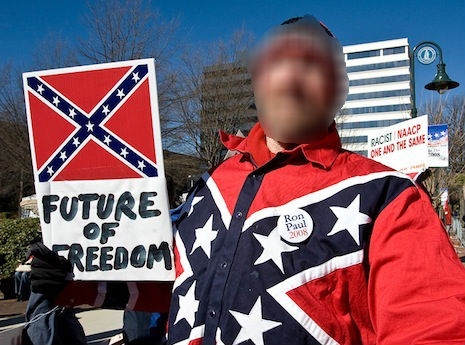
Take note, Tea Party: No spelling mistakes here
The League of the South is not your ordinary band of Southern racists. In describing the group, the Southern Poverty Law Center emphasizes its intellectual credentials—“Originally founded by a group that included many Southern university professors, the group lost its Ph.D.s as it became more explicitly racist.” Hmmm. It seems that the professorial roots of the group have never really gone away, no matter how small the group is today. The group’s mission is, per the SPLC, is as follows: “The league believes the “godly” nation it wants to form should be run by an “Anglo-Celtic” (read: white) elite that would establish a Christian theocratic state and politically dominate blacks and other minorities.” It turns out that the League of the South takes that “Anglo-Celtic” thing pretty seriously.
Buried on the group’s website is a series of pages on the theme of “Verbal Independence.” They were written by Dr. James Everett Kibler Jr., and just by using periods to cap off the “Dr.” and the “Jr.” there, I’m annoying the good doctor mightily, for as he writes, seeking an unimpeachable Southern authority to justify his preference: “Mr Mrs Ms Dr Sr Jr Rev Esq—We do not use a period with these abbreviations. Interestingly, the great Southern writer William Faulkner always deleted the period in Mr and Mrs. ... We Southerners certainly thus have powerful precedent in adopting these forms used by the 20th century writer most celebrated worldwide. So, indeed, thank you Mr (no period) Faulkner.” Kibler is identified as the League’s “Cultural Committee Chairman.”

Dr. James Everett Kibler Jr.
So what kind of “style guide” does a committed racist write? Turns out, one that would not garner any attention whatsoever in the United Kingdom. That is to say, the bulk of Kibler’s guide is dedicated to such exciting prescriptions as spelling “color” with an extra “u,” replacing the “z” in “organize” with an “s,” and so on. Kibler even takes pains to insist upon single quotation marks in preference to double quotation marks and vice versa, just like they do in England. Kibler also includes a “special section” of words not covered by any rule, such as cheque, meagre, enquiry, and so on.
Once you get past the British-American style recommendations, the style guide degenerates into a series of ad hoc rules designed to retrofit a system of grammar around preexisting Southern phraseology, as in the paragraph that states that “mash” is too a perfectly acceptable synonym for “press,” as in telling someone to “mash three, please” in an elevator. (It took me a few moments to glean his meaning, actually, but I’m a nasty Northern type.) Amusingly, his irritation over this word apparently stems from incidents “in a Northern city (like Atlanta or Charlotte).” Burn! Take that, Atlanta!
One of KIbler’s longest entries is about the distinction between the words raise and rear. Now, I have to confess .... I’m an editor by trade, I’ve edited at least 150 books in my time as well as countless other pieces of printed matter. I’ve read style guides very much like that produced by Dr. Kibler (only with less racism). I’m a devotee of the Chicago Manual of Style. So all this stuff is very, very familiar to me. I do this for a living, I think about the differences between titular and eponymous, between further and farther, and much else.
All of that is preamble to this: confession: I have never seriously considered the words raise and rear as being of especial interest. Not so Dr. Kibler—he is very upset about raise and rear. Let’s give him the floor (note that the removal of apostrophes from single-syllable words accords with one of his rules):
A celebrated Pulitzer prize winning, South-hating author of my acquaintance once chastised me in an emotional outburst for my saying a certain black lady was raised near my home. ‘Like turnips!’ he blazed with righteousness, saying I had used a racially demeaning figure of speech like the ‘n-word’ or boy. Even after I got over my initial shock, I did not attempt to explain what most Southerners know—that we in the South are (if we are fortunate enough) all raised, both black and white, and not reared. And it is, indeed, no doubt, like turnips with us—yes, and also like cotton, okra, and beans—and with no shame in that! Any agrarian people well knows the image is a good one, for crops need the careful long process of planting, daily tendance, and then the grace of God over all—to yield up a successful crop. Raising requires great loving care and more than just biological growth. So out of our noble Southern agrarian heritage, let us keep our expression to raise, and foreswear to rear. And that will make certain we also keep the good old countryman’s phrase, ‘Boy, aint you had no raising?’ And we’ll know precisely what we mean. Because inherent in raising is good, courteous behaviour—good manners which must be taught in social situations by the family.
Call me crazy, but if touchy incidents involving race yielding a ringing sense of ressentiment constitute the core of your orthographical and grammatical agenda, it may be that you’re not really all that interested in spelling and grammar to begin with.

A League of the South billboard—again, no typos
Thanks to Mark Davis!





